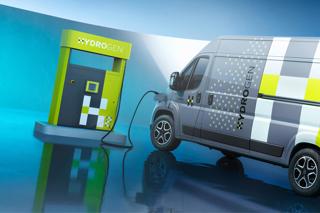Public and private sector fleets will be able to get up to 75% off the cost of hydrogen-fuelled vehicles thanks to the launch of a £2 million Government fund.
The Fuel Cell Electric Vehicle (FCEV) Fleet Support Scheme will allow local authorities, health trusts, police forces, fire brigades and private companies to bid for funding to add hydrogen-powered vehicles to their fleets.
The fund, launched by the government’s Office for Low Emission Vehicles (OLEV), could deliver up to 100 more hydrogen fuel cell cars and vans onto our roads by next spring – the equivalent of tripling the number of vehicles currently in use.
It comes after the Government committed £5m in 2014 through the Hydrogen for Transport Advancement Programme for 12 hydrogen refuelling stations. Transport Minister Andrew Jones (pictured) opened the second of these stations yesterday (May 10) at the National Physical Laboratory in Teddington. All 12 stations are expected to be open by the end of the year, which is a significant step towards a national network.
Jones said: “We are always looking at new ways to make the vehicles of the future cleaner, and hydrogen fuel cells are an important part of our vision for almost all cars and vans to be zero-emission by 2050.
“This funding, along with the growing network of hydrogen refuelling stations opening in England, will help businesses and the public sector to get on board with this exciting technology. This is further proof that we are leading the way in making journeys cleaner and protecting the environment.”
The money will cover up to 75% of the costs of new vehicles bought by next April (2017), as well as the cost of running them for up to three years. Support will also be available for the leasing or renting of vehicles, insurance, hydrogen fuel and servicing.
The market and technology for hydrogen FCEVs is new but slowly gathering pace. Vehicle manufacturers have so far introduced a small number of models, with global production currently limited to just a few thousand units.
The UK is one of only five launch markets for these vehicles: Toyota and Hyundai each have a single FCEV model for sale in the UK – the Mirai and the iX35 Fuel Cell respectively - with more to come.
With the Hyundai ix35 fuel cell already in use by businesses such as Johnson Mathey, TfL, Air Products, ITM Power and Anglo American, Hyundai has seen demand grow in line with developments in the refuelling infrastructure. There are nearly 400 ix35 Fuel Cells on the road globally and 15 in the UK.
Hyundai Motor UK CEO Tony Whitehorn said: “When we made the ix35 Fuel Cell commercially available we were blazing a trail, and we made a commitment to help in the development of the refuelling infrastructure – the fruits of which can clearly be seen with this, and other station launches happening this year.
"We also know how well received the ix35 Fuel Cell is with our existing fleet customers so we’re very happy to be involved with the government’s new £2m fund to encourage more businesses to switch to hydrogen.”
Paul Van der Burgh, Toyota (GB) president and managing director, said: “The opening of ITM Power’s new filling station is an excellent example of how a coordinated hydrogen fuel infrastructure is successfully being developed in the UK with backing from the HyFive consortium.
“We are pleased to continue our support for the wider provision of hydrogen fuel outlets, which will encourage increased customer uptake of zero-emissions hydrogen fuel cell vehicles such as the Toyota Mirai saloon.”
RAC Business spokesman Simon Peevers added: “Given the range of benefits that come with running zero and low emission vehicles in terms of running costs, there is certainly the will among businesses to make a change and realise those cost savings, if they can overcome the initial outlay. So it’s welcome that the Government recognises the importance of supporting fleets to encourage the transition to zero-emission vehicles.”
However, he added: “Within the wider context of the fleet sector it remains to be seen whether £2m is enough to make a serious impact on encouraging businesses to upgrade their vehicles, but it is a step in the right direction as long as there is the infrastructure in place to support the new technology.”
Bids for the FCEV Fleet Support Scheme must be submitted by Monday, July 4, 2016. Successful bidders will be informed later this year. Click here for further information.






















Login to comment
Comments
No comments have been made yet.